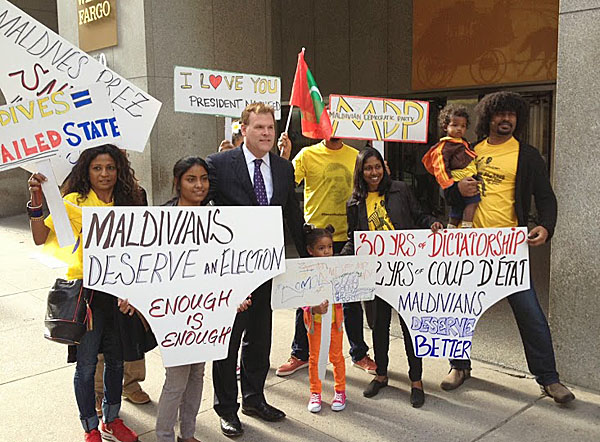Canadian Foreign Affairs Minister John Baird has described recent developments in the Maldives as “disturbing”, expressing concern over the current human rights situation.
“The likely kidnapping of a leading local journalist and threats and attacks against other journalists, politicians and activists are particularly disturbing,” read a statement from the Foreign Affairs Ministry.
Baird subsequently labelled the legal action against the Human Rights Commission of Maldives – initiated in relation to a report submitted to the UN Human Rights Council – as “unfortunate”.
He described the Supreme Court’s suo moto case – which continues today (September 30) – as “a decision that will not help to restore its credibility. Free speech must be protected, not trampled.”
Recent attacks on the office of Minivan News, the office of the opposition Maldivian Democratic Party (MDP), and the homes of MDP MPs have prompted international condemnation.
The Maldives Ministry of Foreign Affairs was joined by the United States and Reporters Without Borders in condemning the night of lawlessness in the capital Malé following the Minivan News incident.
Foreign Minister Dunya Maumoon “noted that the government remains strongly committed to create an environment that gives protection to media personnel to exercise their duties freely and responsibly.”
The UK Foreign and Commonwealth Office was the first foreign government to officially register such concerns earlier this month in relation to a growing culture of death threats and the disappearance of Minivan News journalist Ahmed Rilwan on August 8.
Baird has been notable for his strong statements regarding the Maldives in recent years, often resulting in criticism from the government.
A statement from the Canadian minister in 2012 regarding the alleged persecution of opposition MPs was described as “misleading” and “one-sided” by government officials.
Similarly, last year President Dr Mohamed Waheed wrote a letter of complaint to Canadian Prime Minister Stephen Harper, accusing Baird of making “inappropriate and derogatory remarks” towards then acting Foreign Minister Dr Mariyam Shakeela during a Commonwealth Ministerial Action Group meeting.
Concerned by extremism
“Canada is concerned by disturbing reports of increasing Islamic extremism and deterioration in the promotion and protection of human rights in the Maldives,” continued Baird’s statement yesterday (September 29).
“The government and judiciary must demonstrate a clearer commitment to dealing with these issues, including indications of domestic support for the so-called Islamic State of Iraq and the Levant (ISIL),” said Baird.
A number of Maldivians are reported to have been killed this year while waging Jihad in the Syrian civil war, while local groups marched through the capital this month waving the the ISIS/ISIL flag.
‘To hell with democracy’, ‘Democracy is a failed system’, ‘Shariah gave you the rights, not democracy”, ‘Shariah is the only solution’, read the placards of the 150 demonstrators.
Government leaders have spoken out against atrocities committed by ISIS forces in the Middle East as well as discouraging Maldivians from participating in foreign conflicts.
“IS is using the veil of religion as a pretext for inflicting terror, and committing violations of human rights,” said Dunya in August.
“Their philosophy blatantly violates the fundamental principles of peace, tolerance, and unity which are advocated by Islam, and their actions have tarnished the world’s perception of our great religion. A religion of peace and tolerance.”
Both former President Mohamed Nasheed and an independent report commissioned by the Maldivian Democracy Network have suggested radicalised gangs were likely to have been involved in the disappearance of Rilwan 53 days ago.
After Nasheed’s comments at an MDP rally last week, MP Eva Abdulla received a threat suggesting the next MDP event would be attacked by a suicide bomber. Threats sent to journalists last week warned against reporting on the continuing spate of attacks.
“This is a war between the laadheenee [secular or irreligious] MDP mob and religious people. We advise the media not to come in the middle of this. We won’t hesitate to kill you,” read one widely circulated SMS.
Nasheed has argued that the Maldives now represents a fertile recruiting ground for international jihadi movements, suggesting that the government’s inaction posed a serious danger to the security of the country.
Attempts to shut down congregations considered to be conducting unauthorised sermons, labelled “extremist” by the Islamic minister, have proved unsuccessful in recent months.
A Facebook page called Islamic State in Maldives promoting IS in the country was discovered last month, which shared photos of protests calling for a ban on Israeli tourists where protesters carried the IS flag.
Moreover, a new site called Haqqu and Twitter account sprang up recently featuring IS-related news and publications in Dhivehi as well as translations of a sermon by self-proclaimed Caliph Abu Bakr al-Baghdadi.
Rilwan was one of the first journalists in the Maldives to write in depth about Maldivian jihadis, receiving intimidation from online groups as a result of his research.
